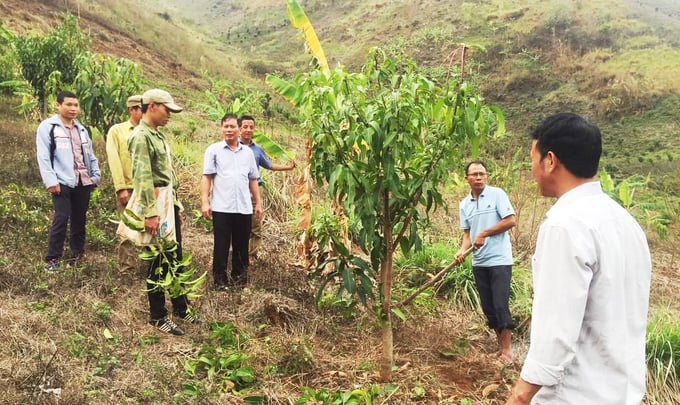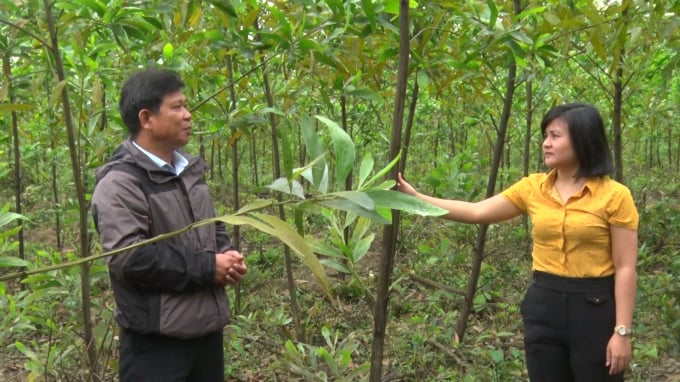May 27, 2025 | 14:39 GMT +7
May 27, 2025 | 14:39 GMT +7
Hotline: 0913.378.918
May 27, 2025 | 14:39 GMT +7
Hotline: 0913.378.918
Vietnam houses an extensive expanse of forests and forestry land, underscoring the significance of sustainable production under the form of agroforestry.
Throughout the three decades of collaboration with the local residents, particularly the ethnic minority communities in remote and mountainous regions, afforestation efforts have yielded substantial contributions, demonstrating the multifaceted value inherent in Vietnamese forests.

The grafted "gioi" variety is being planted in many provinces and cities nationwide. Photo: Nguyen Thanh.
Notable afforestation activities include the implementation of multiple demonstration agroforestry models, and production models on sloping land. Accordingly, these models combine long-term forestry species such as green ironwood, green "gioi", seed-bearing "gioi", Indian mahogany, mangium, teak, macadamia, in combination with fruit-bearing trees such as plum, mango, orange, pomelo, lychee, longan, pineapple, etc., or short-term agricultural crops. These models attracted the participation of nearly 3,000 households in the northern mountainous provinces and the Central region.
In addition to demonstration models, extensive information dissemination and training activities have been organized, with over 10,000 promotional materials distributed. Agricultural extension events, including forums, competitions, and coordinated media campaigns across various platforms, are also regularly conducted.
According to statistics, over 12,000 news articles, photographs, and reports have been disseminated through various media channels, including television, radio, newspapers, and magazines, featuring diverse ethnic minority languages. This effort contributes to enhancing households' awareness regarding sustainable forest farming and FSC-certified forest management.

Many agroforestry models combining forestry trees with fruit-bearing trees have contributed to increasing forest coverage and income for people in mountainous areas. Photo: TL.
Notably, the program "Farmers Tips" is regularly broadcasted on the Voice of Vietnam Radio in 12 ethnic minority languages across the Northwest region, the Central Highlands, western Nghe An - Thanh Hoa, and the Southwest region. The program has contributed to raising the awareness of local residents in mountainous areas. Accordingly, it has shifted their focus from an exploitation-centric approach towards forests to sustainable production methods following the principle of "nurturing short-term for the long-term."
Additionally, afforestation activities have transferred advanced techniques and new forestry varieties with certified origins and high productivity, quality to mountainous communities, thereby promoting the production of material timber. A notable activity includes the involvement of over 5,000 households in nearly 30,000 hectares of afforestation models, resulting in a 20 to 25% increase in the value of planted forests.
Advanced production processes, which transform small timber forests into large forests, have played an important role in increasing the added value of products in the business cycle.
Furthermore, emphasis has been placed on joint ventures and partnerships with wood processing businesses. These collaborative activities have contributed to stabilizing the income of forest growers, and allowing businesses to proactively secure raw materials for processing and export.

Recent afforestation models with a focus on planting and transforming small timber forests have been instrumental in supporting the development of the forestry sector. Photo: Vo Dung.
The partnership models have formed a closed-loop value chain, which includes the stages of planting, nurturing, harvesting, processing and product consumption. Additionally, the models ensure a balanced benefit among its stakeholders. These models generate a revenue ranging from 270 to 300 million Vietnamese dong per hectare for one business cycle.
Accordingly, producers participating in these models receive training in production techniques, management skills, and production organization. The training also covers practical and effective topics tailored to the specific needs of each participant and the production stages.
One outstanding example includes Bac Kan province, which is projected to plant more than 4,000 hectares of forests in 2023, with over 3,000 hectares of concentrated forest areas, and the remainder being scattered forest areas.
With the aim of supporting afforestation efforts, tree nurseries in Bac Kan province have produced over 11.3 million seedlings of various species. According to the Bac Kan province's Sub-Department Forest Protection, these local seedling suppliers meet the requirements for the production and trading of forestry seedlings by ensuring sufficient origin records as per regulations. Common seedling varieties include Manglietia conifera, acacia, pine, star anise, cinnamon, and several other timber species.
However, the prolonged drought between April and mid-June of 2023 has significantly affected the afforestation progress. Over 400 hectares of newly planted forests suffered from drought, resulting in withered leaves which need replanting.
Starting from July, afforestation progress has accelerated thanks to favorable weather conditions. To date, Bac Kan province has planted nearly 5,000 hectares of forests, achieving 123% of the plan. This includes concentrated forest areas (replanted after logging and various programs/projects), which cover nearly 3,500 hectares, and scattered forest areas, which cover nearly 1,500 hectares.
In accordance with the One Billion Trees for a Green Vietnam program, the province has planted over 2.5 million trees, surpassing 157% of the plan.
Translated by Nguyen Hai Long
/2025/05/25/4127-3-073637_820.jpg)
(VAN) Thanks to the promotion from an FAO-implemented project, vegetable production in greenhouses in Moc Chau has seen strong development, from 1.5 hectares in 2021 to nearly 50 hectares in 2024.

(VAN) FAO has recently supported USD 140,000 to implement the project 'Risk mitigation human-animal interface risks through disease control initiatives in pig farming.'

(VAN) The People's Committee of Tra Vinh province has approved an adjustment to the investment policy for the Green Hydrogen Plant project, increasing its area to approximately 52.76 hectares.
![Reducing emissions from rice fields: [2] Farmers’ commitment to the soil](https://t.ex-cdn.com/nongnghiepmoitruong.vn/608w/files/news/2025/05/05/dsc08881jpg-nongnghiep-140632.jpg)
(VAN) Clean rice cultivation model in Thuong Tan commune, Bac Tan Uyen district, is assisting local residents in achieving sustainable agriculture by substantially reducing costs, increasing productivity, and protecting the environment.

(VAN) At the conference to disseminate Resolution No. 68, AgriS introduced its digital agricultural ecosystem and reaffirmed its commitment to accompanying the Government in promoting private sector development and sustainable agriculture.

(VAN) 'Blue Ocean - Blue Foods' initiative is designed to restore marine ecosystems and establish sustainable livelihoods for local communities by cultivating a minimum of 1,000 hectares of cottonii seaweed in the first three years.
/2025/05/21/4642-3-112707_603.jpg)
(VAN) The V-SCOPE project has made direct contributions to three out of six pillars of the Comprehensive Strategic Partnership between Vietnam and Australia.